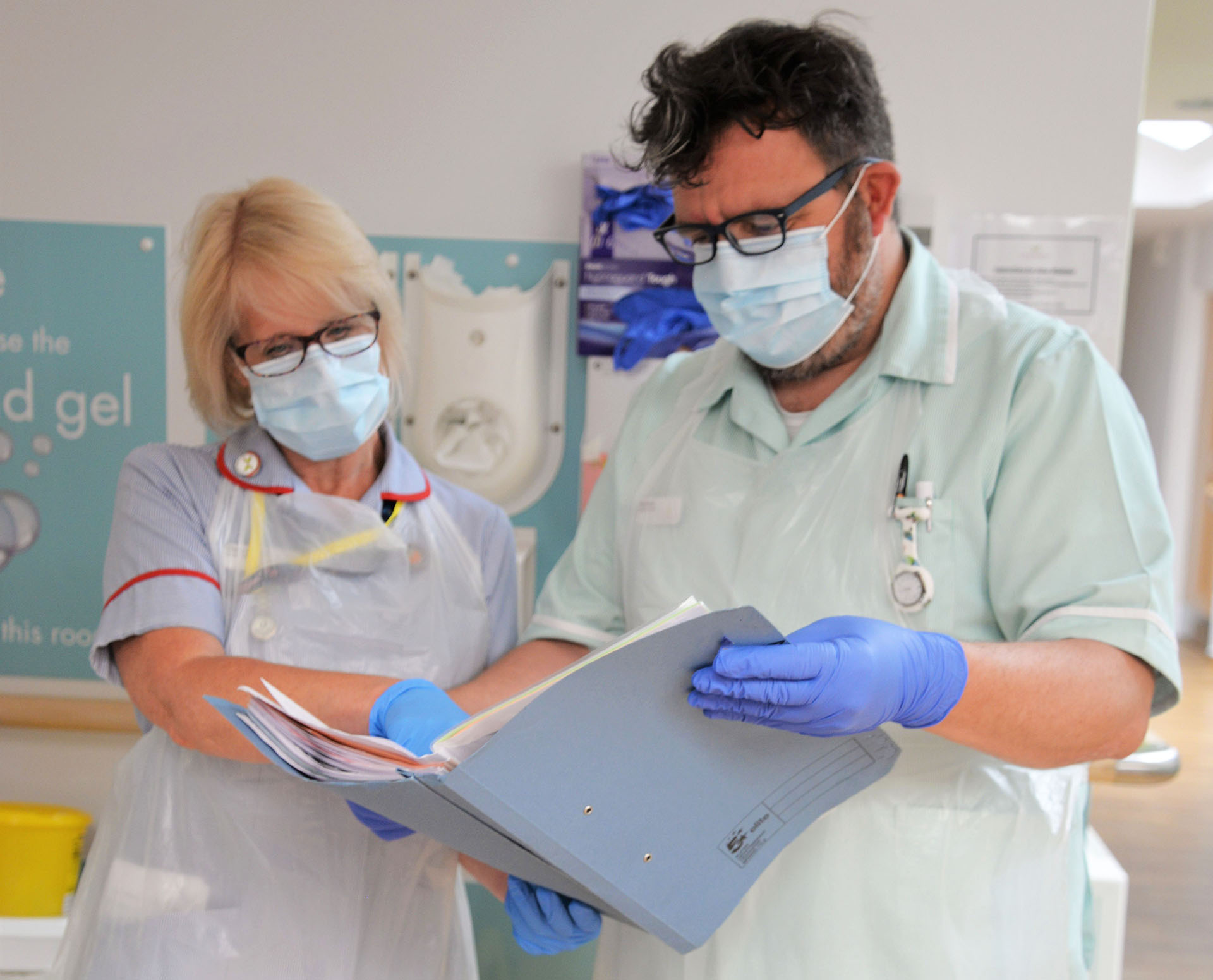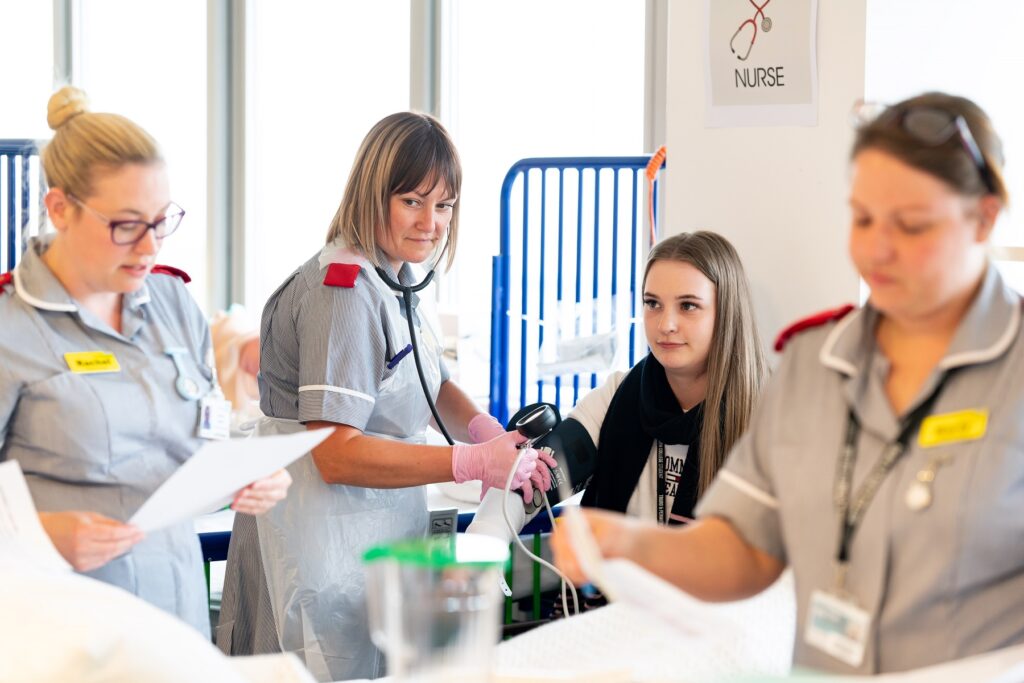New students starting in September: You can find more information about Induction days and submitting your GCSE results in our Start of Year Guide.
Why Choose This Course?
This apprenticeship standard is designed for individuals passionate about providing high-quality and compassionate health and social care across various settings, including hospitals, community teams, birthing centres, and care homes. Apprentices will support registered healthcare professionals in delivering clinical, therapeutic, and diagnostic care. This standard offers specialisation in four key areas: Adult Nursing Support, Maternity Support, Theatre Support, and Mental Health Support. Each specialisation focuses on specific patient groups and care settings, ensuring apprentices gain tailored skills and knowledge.
Apply for this course
Start date: 08/09/2025
Top course highlights
Industry-standard facilities
Highly experienced tutors
Develop skills in line with industry needs
Learn from sector experts
Gain invaluable insights and hands-on experience from industry expert tutors who bring real-world knowledge and expertise to the classroom. Their guidance will help you develop the skills and confidence needed to excel in your chosen field.
Develop work-related skills
Enhance your practical abilities and gain hands-on experience that directly translates to the workplace. This apprenticeship course focuses on real-world applications, ensuring you are well-prepared to meet the demands of your chosen career.
Enjoy professional surroundings
Immerse yourself in a dynamic and supportive environment that mirrors the professional world. This apprenticeship course provides access to state-of-the-art facilities and resources, helping you to thrive and feel confident in your career journey.
What Will I Learn?
Knowledge This apprenticeship covers a broad range of knowledge essential for providing high-quality care. Apprentices will learn about anatomy and physiology, understanding how the body functions and the impact of health conditions on individuals. They will gain insights into infection prevention and control, ensuring safe and hygienic practices to protect patients and themselves. Knowledge of mental health conditions and well-being is also covered, enabling apprentices to support individuals with mental health issues effectively. Additionally, apprentices will study medication management, learning about different types of medications, their uses, and safe administration practices. Understanding legal and ethical frameworks governing healthcare is crucial, ensuring apprentices adhere to regulations and provide care with compassion and respect.
Skills This apprenticeship enables learners to develop a variety of practical skills to support their knowledge. They will learn to perform clinical tasks such as taking vital signs, assisting with wound care, and supporting patients with mobility. Skills in communication are emphasised, enabling apprentices to interact effectively with patients, families, and healthcare professionals. Apprentices will also hone their problem-solving abilities, addressing patient needs and adapting care plans as necessary. Teamwork is a critical skill, as apprentices will work closely with other healthcare professionals to deliver coordinated care. Additionally, they will develop emotional resilience and empathy, essential for providing compassionate support to patients facing challenging health conditions.
Behaviours Apprentices should demonstrate key behaviours such as compassion, ensuring apprentices provide empathetic and patient-centred care. Professionalism is crucial, with apprentices expected to maintain high standards of conduct and confidentiality. Adaptability is also highlighted, enabling apprentices to respond effectively to changing situations and diverse patient needs. Additionally, apprentices are encouraged to demonstrate teamwork and collaboration.
Typical Duties that an Apprentice will carry out in the workplace:
- Assisting with clinical tasks such as taking vital signs, dressing wounds, and patient mobility.
- Helping with personal care activities like feeding, washing, and toileting.
- Performing theatre support duties, including preparing equipment, assisting during surgical procedures, and helping patients recover post-operation.
- Providing emotional assistance, collaborating on care plans, and monitoring changes in patients’ well-being in mental health support roles.
Where Will It Take Me?
Completing the Senior Healthcare Support Worker Apprenticeship Standard opens up numerous career pathways in the healthcare sector. Apprentices can progress to more advanced roles, such as the Level 5 Nursing Associate Apprenticeship with the University Centre Truro & Penwith. This progression allows apprentices to further develop their skills and knowledge, bridging the gap between healthcare support workers and registered nurses.
Assessment Arrangements
The End-Point Assessment (EPA) is a crucial component of apprenticeship standards, designed to evaluate an apprentice’s knowledge, skills, and behaviours (KSBs) acquired during their training. The EPA typically includes a combination of practical assessments, professional discussions, and portfolio reviews, ensuring apprentices are fully prepared for their chosen career. This assessment is carried out independently by an End-Point Assessment Organisation (EPAO), ensuring impartiality and fairness. Employers play a key role in confirming readiness for the EPA, supporting apprentices throughout the process to achieve successful outcomes.
EPA (End Point Assessment) methods
- Observation of practice with questions
- Professional discussion (Interview) underpinned by a portfolio of evidence
Entry Requirements
Applicants for this apprenticeship need to be aged 18 or above and already be working within a Healthcare role. For school leavers looking to progress onto this pathway once they are 18, a relevant Level 2 qualification alongside maths and English is recommended.
The following entry criteria apply:
- English GCSE A-C (4-9) or Functional Skills Level 2.
- Working on a substantive contract.
- Working a minimum or 30 hours a week.
- Will have work based support.
- Will be released one day a week to the College.
- Will have support to achieve the 20% off-the-job requirement.
Meet the staff, tour the campus and find out about life as a student at one of the best colleges in the country.







